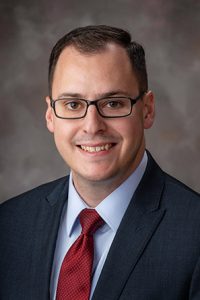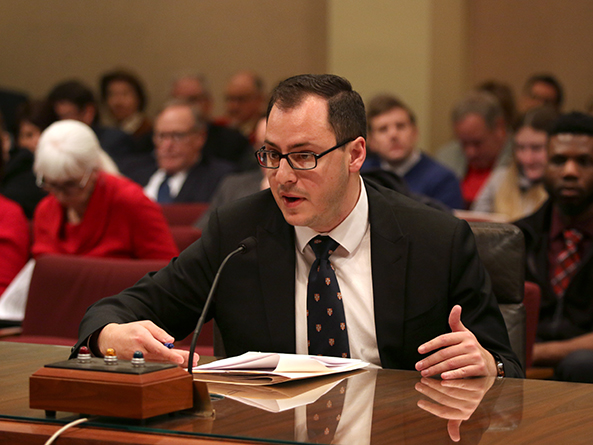Easing of occupational licensure requirements proposed
Certain occupational licenses would be easier to obtain in Nebraska under a bill considered Feb. 13 by the Government, Military and Veterans Affairs Committee.

LB1187, introduced by Gretna Sen. Andrew La Grone, would allow an occupational board to grant an occupational license or government certification if the:
• applicant has held a current occupational license or government certification in another state with a similar scope of practice for at least one year;
• board in the applicant’s state required the applicant to pass an exam or meet educational, training or experience standards; and
• applicant’s license or certification was not revoked or surrendered for negligence or intentional misconduct and there are no complaints, allegations or pending investigations of an alleged crime or unprofessional conduct.
If an applicant works in a state that does not require a license or certification in their profession, he or she may obtain a license or certification in Nebraska if they have worked in their profession for three years and are in good standing.
The bill would allow a Nebraska occupational board to require an applicant pass an exam before granting a license and would exclude occupations governed by an interstate compact in which Nebraska participates.
La Grone said the bill would change the philosophy of licensure in Nebraska from whom should the state include to whom should the state exclude from participating in the workforce.
“It’s better to let people do their occupation and fill those positions,” La Grone said.
Laura Ebke of the Platte Institute testified in support of LB1187, saying it would not lower Nebraska’s licensure standards.
“That implies that those working in occupations in Nebraska are uniquely qualified to be psychologists, geologists, barbers, cosmetologists, electricians or plumbers, and that those in other states are somehow in danger,” she said. “This fear, in most occupations, more likely points to the random nature of occupational licenses from state to state, and a desire to keep those who might compete out.”
Lee McGrath of the Institute for Justice also testified in support. He said loosening licensure requirements would be a boon to people looking for work in Nebraska.
“You have a problem in Nebraska; you have too few workers,” McGrath said. “This bill provides an efficient way in which boards can recognize the credentials of people who want to come and work here.”
Ken Allen, director of the state Board of Barber Examiners, spoke in opposition to LB1187. Nebraska has a broader scope of practice for barbers than other states, he said, including allowing the application of chemicals to hair. The bill would lower standards, Allen said.
“That’s a health risk to the people being served,” he said.
Kris Rohde, speaking on behalf of the Nebraska Nurse Practitioners and the Nebraska Association of Nurse Anesthetists, testified against the bill. Scopes of practice in Nebraska differ from other states, she said, for example, anesthetists in Nebraska do not require supervision while those in other states do.
“You have people who are used to practicing with someone telling them what to do and you get used to that,” Rohde said. “So then you move to a small town in Nebraska and you [don’t have supervision] and you don’t know what you’re doing on your own. That puts a patient at risk.”
Chris Callihan, president of the Nebraska State Council of Electrical Workers, also testified in opposition. He said the bill would “water down” standards and undermine the 1,800 electricians based in Nebraska.
“Do they not deserve the respect of earning that level of licensing?” Callihan said.
The committee took no immediate action on LB1187.


